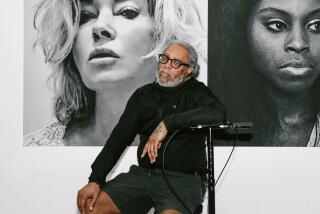Love, PJ’s Way: The Glamour, the Torment : Pop music review: Harvey delivers messages of emotional disjointedness at the Mayan.
PJ Harvey opened her concert at the Mayan Theatre on Wednesday with the title song of her latest album, “To Bring You My Love,” and followed with its counterpart, “Bring Your Love to Me.”
Together, the songs form a blasted emotional landscape where love is in turn a dark compulsion and a claustrophobic, imprisoning force. The music goes from scary blues to creepy folk-cabaret.
And Harvey presented this tormented fare as if she were Gloria Estefan. The woman who once sported severe, pulled-back hair and punk-issue black wiggled and mugged across the stage in a slinky red satin gown and glamorous hairdo.
Rather than a gimmick or a case of misplaced mockery, Harvey’s strategy reinforced the emotional disjointedness she sings about: There was something just exaggerated and inappropriate enough about her heavy makeup, glamorous garb and creepy stage smile to suggest the currents that pull her toward the abyss.
This is the kind of risk that has made the Englishwoman a cult heroine on the brink of big things for a few years now. Her more flamboyant musical and performance approach seems likely to enlarge her audience, and the uncompromising nature of her themes is certainly what’s being embraced by the alternative-rock generation.
At the first of her two nights at the Mayan, Harvey didn’t allow her stage persona to distance her music, whose every pinpoint of terror, obsession and desolation came across with primal directness, untouched by ambiguity.
Much as her early austere look and stance have burst into theatrical flower, her music has responded to the imperatives of her themes. Harvey’s original trio played with striking power, but limited range. The new group handles a much wider spectrum, following her into forbidding areas of distorted blues, catchy pop-rock and even crumbling, clattering light-industrial rock.
In a show emphasizing the new album’s material, their backing freed Harvey to revel in the combat she describes in “Meet Ze Monsta” (with its pulverizing garage-band “Midnight Hour” riff), and to send chills through the crowd with the mad, whispered refrain of “Down by the Water.”
Water, as something that both cleanses and drowns, is one of the prominent elemental archetypes that figure with increasing prominence in Harvey’s maturing writing. Drawing images from nature, the Bible and the blues, she plunges into turbulent vortexes of religious/sexual/psychological conflict, and she endows some of her direct, blues-simple couplets with an incantatory power.
Easing her facade a bit to finally acknowledge the audience, she ended the show with “Good Night,” pounding the floor with a wooden staff on the measured, heavy beat like some ancient of the woods. Her evocation of a secure life in the country was still more haunting than idyllic, but she gave it a more comforting reading than the mournful, bitter one on the “4-Track Demos” album.
And she tagged it with, “Good night, Irene, I’ll see you in my dreams.” When it comes to sources, the Book of Leadbelly can be as good as Revelations.
More to Read
The biggest entertainment stories
Get our big stories about Hollywood, film, television, music, arts, culture and more right in your inbox as soon as they publish.
You may occasionally receive promotional content from the Los Angeles Times.










